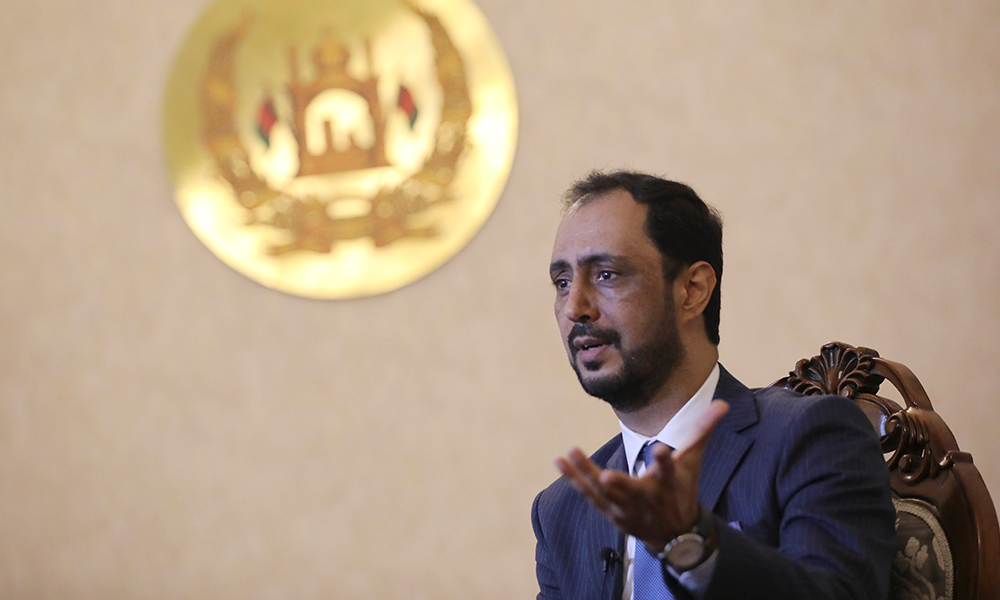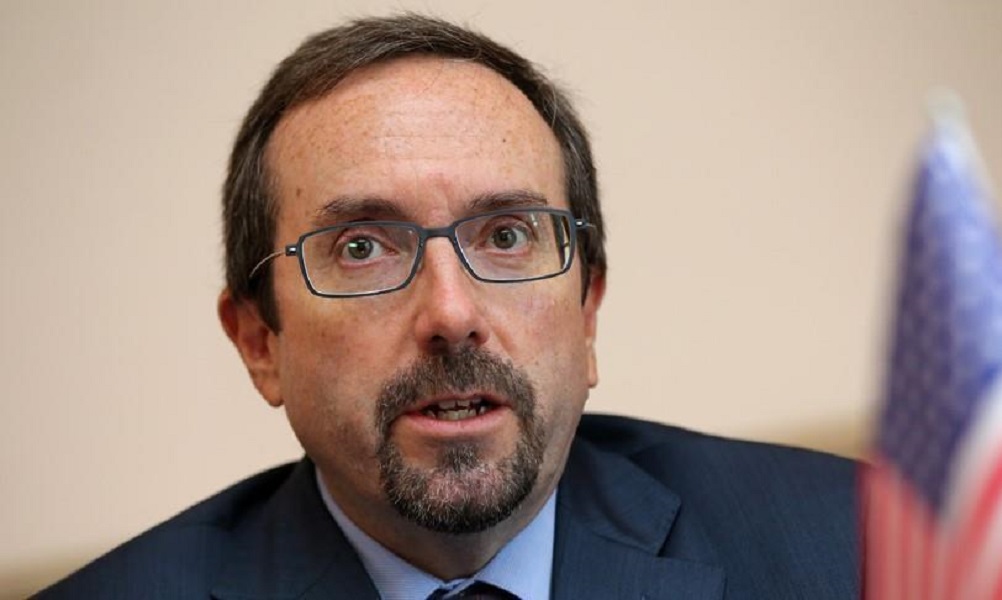Latest News
Beware Taliban promises, Afghanistan envoy to China warns

The Taliban cannot be trusted to keep their promise to China not to harbour Islamist militants seeking separatism in its Xinjiang region, Afghanistan‘s ambassador to China told Reuters, a week after China hosted Taliban officials.
The withdrawal of U.S. forces from Afghanistan, and a surge in fighting as Taliban insurgents gain territory, raise concerns for China, which worries that more instability in the region will disrupt its Belt and Road plan for infrastructure and energy links to the west and embolden separatists to destabilise its far western Xinjiang region.
Last week Foreign Minister Wang Yi hosted a Taliban delegation in the northern city of Tianjin, days after meeting U.S. Deputy Secretary of State Wendy Sherman in the same location.
The Taliban pledged not to interfere in China’s internal affairs or allow Afghan territory to be used by anti-China forces.
But Afghan ambassador to China, Javid Ahmad Qaem, was dismissive of Taliban promises.
“I don’t think even China believes in that,” Qaem told Reuters in an interview, adding that the Taliban were “only saying this to get regional support”.
Instead of backing one Afghan side against another, as the United States and the Soviet Union have done in the past, China has adopted an “Afghan-led, Afghan-owned” approach, in line with its principle of non-intervention.
“The Chinese position is they want to mediate,” Qaem said in the Thursday interview at his embassy, adding that the U.S.-backed Afghan government welcomed China’s involvement and he understood why it wanted to stick to the middle ground.
The United Nations said in a report last month that the East Turkestan Islamic Movement (ETIM), a militant group affiliated with al Qaeda that China says wants to set up a separate state in Xinjiang, is active in Afghanistan in areas including the northeastern province of Badakshan, where China and Afghanistan share a remote 76 km border.
Qaem, 41, who has been in his post since November 2019, scoffed at the suggestion the Taliban might turn against their fellow militants from Xinjiang.
“It’s the same ideology. How could you expect somebody with the same thinking to fight other people who are with the same thinking?” he said.
China has maintained friendly relations with the Afghan government but also has also hedged its bets, analysts say, with its ties with the Taliban. Last month’s visit by a Taliban delegation followed a similar one in 2019.
In receiving the Taliban officials in their traditional tunics and turbans, Wang called them a “significant military and political force” expected to play a key role in Afghanistan‘s reconstruction.
“As the Taliban gain inroads, China wants to maintain contact and ensure that it is not in the Talibans’ bad books, just in case they come to power,” said Yang Chaohui, a lecturer at the School of International Studies at Peking University.
“China would normally be wary of any grouping that operates on the basis of religious extremism, but it has no intention of fighting the Taliban, because it knows it has no chance of succeeding in what the United States and Soviet Union have both failed to do,” Yang said.
Qaem said he would prefer that China was fully behind the government but also said that Beijing was transparent about its engagement with the Taliban, informing the government before extending its invitation and briefing it afterwards.
“We have faith in the Chinese intentions,” he said.
Qaem said the Afghan government had not asked China to send troops to support it but it could help in other ways.
China could encourage Pakistan – which has long seen the Taliban as the best option for limiting the influence of old rival India in Afghanistan – to build trust with the Afghan government, Qaem said.
China could also serve as a conduit for messages from Kabul to the Taliban, as it was at last week’s meeting – relaying a government call for a ceasefire and an appeal for an inclusive political framework, he said.
China can also help in boosting trade and buying more Afghan products such as saffron, he said.
“So as long as that is provided, I don’t think China needs to send boots,” he said.
Latest News
Pakistan extends registered Afghan refugees’ stay till June 30

Pakistan’s government on Friday extended the stay of Afghan refugees in the country till June 30, amid repatriation of illegal foreign nationals.
There are around 1.3 million registered Afghans living in Pakistan, according to a spokesman for UN refugee agency UNHCR in Islamabad, Dawn newspaper reported.
“On the recommendation of the Ministry of States and Frontier Regions, the federal cabinet approved the extension of the validity of PoR cards of Afghan refugees from April 1, 2024, to June 30, 2024,” said an official statement, issued by the Prime Minister’s Office.
The PoR cardholders will be repatriated in the third phase of the plan that will begin after the repatriation of “illegal foreign nationals” residing in Pakistan is completed, the statement added.
The PoR card holders avail schools, bank accounts and other facilities in Pakistan.
Repatriation of undocumented refugees began on November 1 and continues. More than 500,000 Afghans have been expelled so far.
Latest News
US diplomat Bass travels to Qatar and Pakistan to discuss Afghanistan, regional issues

John Bass, US acting under secretary of state for political affairs, will travel to Qatar and Pakistan April 26-30, US State Department announced on Friday.
In Doha, Qatar, he will meet with senior Qatari government officials and other diplomatic missions to discuss support for Afghanistan and shared security interests in the region, US State Department said in a statement.
In Islamabad, Pakistan, Under Secretary Bass will meet with senior Pakistani government officials to discuss a range of regional and bilateral issues as part of the U.S.-Pakistani partnership, the statement added.
John Bass served as US ambassador to Afghanistan under Donald Trump administration between December 2017 and January 2020.
Latest News
Tripartite trade meeting held in Kabul to boost regional connectivity

A tripartite meeting between the delegations of Afghanistan, Turkmenistan and Kazakhstan was held in Kabul with the aim of connecting North Asia to South Asia and reducing transit and transportation costs among these three countries, the Ministry of Trade and Commerce said in a statement.
In this meeting, an agreement was reached on the creation of a joint technical committee to continue the talks.
This tripartite meeting was held under the leadership of Nooruddin Azizi, the Acting Minister of Industry and Commerce, Vice President of Turkmenistan and Srik Zhumangarin, the Deputy Prime Minister of Kazakhstan.
Earlier, a bilateral meeting was held between the delegation of the Islamic Emirate and Turkmenistan. The ministry of commerce said the participants of the meeting discussed the construction of a large joint logistics center in Torghondi, the trilateral transit agreement between the IEA, Turkmenistan, and Kazakhstan, the expansion of Afghanistan’s railway, solving issues related to Afghan transit and export goods, and a number of other commercial issues.
-

 Latest News4 days ago
Latest News4 days agoRashid Khan named AWCC’s brand ambassador
-

 Regional5 days ago
Regional5 days agoIranian president lands in Pakistan for three-day visit to mend ties
-

 Sport5 days ago
Sport5 days agoKolkata beat Bengaluru by one run in IPL as Kohli fumes at dismissal
-

 Climate Change5 days ago
Climate Change5 days agoRescuers race to reach those trapped by floods in China’s Guangdong
-

 World4 days ago
World4 days agoMalaysian navy helicopters collide in mid-air, 10 killed
-

 Sport4 days ago
Sport4 days agoJaiswal ton powers Rajasthan to big IPL win
-

 Sport4 days ago
Sport4 days agoMawj Sahil player scores stunning halfway line goal in 1-0 win over Jawanan Wahedi
-

 World3 days ago
World3 days agoNorth Korea officials visit Iran in a rare public trip
























